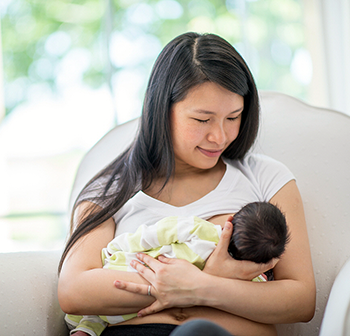
Consuming confinement foods is believed to help boost milk production.
Confinement is a period for your body to recuperate and recover from childbirth.
The confinement period lasts for different durations according to different cultures:
- For Chinese - 30 days
- For Malays - 44 days
- For Indians - 40 days
Many Asian confinement beliefs and practices originate from culture, with little or no scientific backup.
However, the goals of these practices, regardless of cultural background, are similar:
- To purge "wind" from the body after delivery
- Promote "blood circulation"
- Strengthen the joints
- Promote milk supply
- Encourage new mums to avoid "cooling" foods
Chinese confinement diet
Common Chinese confinement dishes include:
- Pig trotters cooked with ginger and vinegar
- Fish soup boiled in papaya – believed to be good for milk production
- Chicken cooked in sesame oil
- A traditional tonic brewed from 10 herbs
- Pork liver and kidney
Common Chinese confinement practices include:
- Eating five or six meals daily and rinsing the rice bowl with scalding water.
- Avoiding the drinking of water during confinement to reduce water retention, and instead, choose a specially-prepared drink made from herbs and preserved dates.
- Avoiding the eating of raw or "cooling" foods, or foods cooked the previous day.
Malay confinement diet
During confinement, new Malay mums are likely to follow a special diet where "heating" foods are encouraged and "cooling" foods avoided to restore the balance upset by the birth.
Some Malay mums have been known to take a special drink called jamu — this stems from the belief that the body's pores open during labour, potentially exposing it to chills, and jamu has properties to keep the body warm.
Another dietary practice is the drinking of air akar kayu or tonic drinks, made from medicinal plants.
Common Malay Confinement practices include:
- Bathing the mother and child in heated water filled with herbs immediately after childbirth.
- Keeping the mum "warm" through various traditional methods, including sitting near to or lying above a heated source, or warming the abdomen by applying a heated stone over it.
- Giving the mother massages to help her regain her figure or keep her tummy trim by tightly binding the tummy, a practice called berbengkong.
- Prohibitting of sex is during the confinement period.
Indian confinement diet
Like the Chinese and Malays, the Indian confinement diet also discourages the consumption of "cooling" foods especially tomatoes, cucumbers, coconut milk and mutton.
Indian mothers may also take garlic milk to prevent "wind". Foods are allowed and encouraged include:
- Chicken and shark fish cooked in herbs
- Plenty of garlic fried without oil
- Oral intake of herbs or D.O.M. to keep the body warm
- Cooking is done with gingly oil.
Seafood and chilli foods are strongly discouraged. There is also restriction on fluids, fruits, and vegetable, as well as cold drinks and cold food.
Common Indian confinement practices
Indian mothers are discouraged from leaving their homes during confinement.
Bathing is also discouraged and if done, should be performed with special herbal preparations and turmeric powder. Bathing is only allowed between 11am and 2pm when the temperature is at its highest.
New mums are encouraged to splash warm water on their abdomen while bathing to expel clots from uterus.
Daily body massages with oil are also encouraged.
Other practices include:
- No entry to the prayer altar room.
- Mums only wash their hair on odd days i.e. day 3,5,7... during the first two weeks, and should dry their hair after washing with incense smoke.
- Some also use incense smoke between their legs to dry the episiotomy wound.
- Some bind their tummy with six-feet-cloth.
- Sex is strictly prohibited during the confinement period.
Related articles:
Tips for Breastfeeding
Breastfeeding: How to Prevent Mastitis and Blocked Ducts
Food Tips for Breastfeeding Moms
Self-Care Tips for New Mothers














 Get it on Google Play
Get it on Google Play